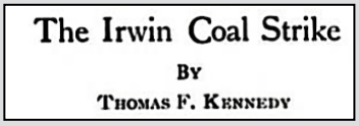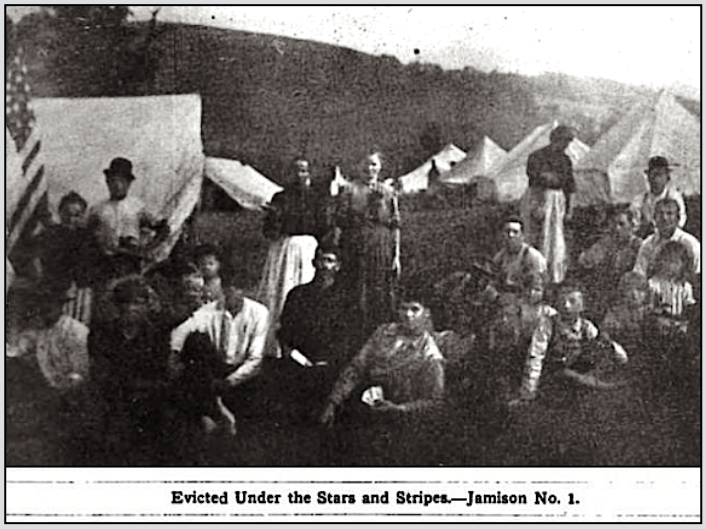 ———-
———-
Hellraisers Journal – Friday August 26, 1910
“The Irwin Coal Strike” by Thomas F. Kennedy, Part II
From the International Socialist Review of August 1910:
[Part II of III]
While they were not immediately successful in every instance, the operators viewed these peaceful demonstrations with dread and alarm. They rushed to the court, demanded and secured immediately a temporary injunction forbidding the marching on the public highways of Westmoreland county. After listening to testimony from both sides, and after the operators had been compelled to admit that all the disorder had been caused by the thugs who were acting as deputies, the judge made it permanent.
The contest in the county court over the granting of the permanent injunction together with several brutal murders committed by agents of the operators and the thugs employed as deputies gave the strike wide publicity. The injunction trial and the murders created more sentiment in favor of the strike amongst all classes than could weeks of preaching and marching.
The injunction was so sweeping, all inclusive and all embracing that when one of their number died the “injuncted” miners who wished to walk on the public highways to attend his funeral to avoid being thrown into prison for contempt of court, had to get a special dispensation.
The dead man, John Cambell, had been a member of the celebrated 10th Pennsylvania regiment and had distinguished himself in the Philippine war, and very properly an American flag was carried at the head of the funeral cortege. When passing Jamison N0. 2, Tom Jamison, one of the Jamison Company, backed by armed deputies, ordered the American flag lowered. When the mourners were returning from the funeral, they were not allowed to follow the most direct route but were compelled by the deputies to take a roundabout road.
Having secured the injunction, the operators commenced evicting workers from the shacks in the company camps. The United Mine Workers who have been providing food for those that needed it from the inception of the strike promptly leased land from farmers and supplied the evicted miners with tents. The camps at each mine are the best kind of an advertisement that there is a strike. Strike breakers secured by employment agents through misrepresentation on seeing the camps are bound to have their curiosity aroused and thus become informed of the strike. Strike-breakers wishing to desert are welcomed at the camps and given food and shelter until they get their bearings and determine what to do. In every case they tell of brazen, bare faced lying by the employment agents, and of being held at the works by force when they found out how they had been deceived. The sherifi of the county promised to investigate numerous cases where men have sworn to being held by force at the mines after they wished to leave. No one has yet been arrested upon these sworn charges of peonage, and it is a safe guess that no operator will ever go to prison for this offense.
Pay for “dead work,” 8 hours, check weighman and recognition of the union are the principal demands. And even though they do not force a single one of these concessions from the operators, a great victory has been gained.
The immediate gains at McKees Rocks were trivial, but the lesson it taught, the inspiration it furnished, the hopes it raised and the impulse it gave, marked it as the beginning of an epoch in the labor movement of America. So it is with the Irwin strike, concession or no concession. To have organized even a partial strike in the Irwin field would have been a notable achievement. To stop production as it is now stopped is a signal victory. It will convince the workers that the masters are not invincible. It will nourish their hopes and strengthen their resolution.
It will show the masters that their position is not impregnable. In future, though the apparent victory may rest with them at the end of this struggle, they will be more careful in taking their pound of flesh. The heroic battles fought by miners in surrounding fields has checked somewhat the rapacity of the Irwin operators. So this battle may prevent many a Shylock from giving the screw another turn.
One thing that greatly favored the strikers is the immense amount of Socialist sentiment throughout the district. There are 10 branches of the Socialist Party right in the Irwin field. There are three branches of the Workmen’s Sick and Death Benefit Fund of America right in the thick of it. When the organizers of the United Mine Workers were trying to hold meetings in March, the operators approached every hall owner in Irwin and cautioned them upon peril of giving mortal offense not to rent halls to the miners. The only hall the miners could secure in or around Irwin was the little hall that is the property of this society.
* * *
After one murderous shooting up of a town by the deputies, the proof that it was entirely their fault was so overwhelming that the sheriff was obliged to arrest 40 of his own deputies and lodge them in jail.
[Emphasis added.]
~~~~~~~~~~~~~~~~~~~~~~
SOURCES & IMAGES
Quote Mother Jones, Last Great Battle, UMWC p420, Jan 26, 1910
https://play.google.com/books/reader?id=WyH1VOBn6BsC&printsec=frontcover&pg=GBS.PA420
The International Socialist Review, Volume 11
(Chicago, Illinois)
-July 1910 to June 1911
Charles H. Kerr & Company, 1911
https://www.marxists.org/history/usa/pubs/isr/
https://books.google.com/books?id=8-05AQAAMAAJ
ISR – Aug 1910
https://play.google.com/books/reader?id=8-05AQAAMAAJ&printsec=frontcover&pg=GBS.PA65
Irwin Coal Strike by Thomas F. Kennedy
https://play.google.com/books/reader?id=8-05AQAAMAAJ&printsec=frontcover&pg=GBS.PA99
Part II-Injunction
https://play.google.com/books/reader?id=8-05AQAAMAAJ&printsec=frontcover&pg=GBS.PA100
See also:
Hellraisers Journal: From International Socialist Review: “The Irwin Coal Strike” by Thomas F. Kennedy, Part I
~~~~~~~~~~~~~~~~~~~~~~~~~~~~~~~~~~~~~~~~~~~~~
Never Cross A Picket Line – Billy Bragg


